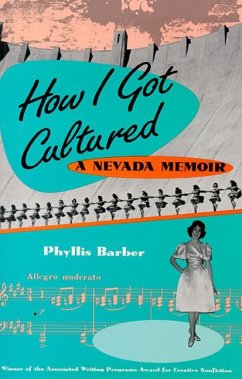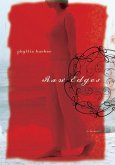Growing up as a Mormon in Nevada during the 1940s and 1950s, Phyllis Barber felt sequestered on the barren margins of a sophisticated and exciting world. Set in and around Las Vegas, America's neon temple of Cold War pop culture, Barber's narrative recalls her early search for any token of artistic and social significance that might survive the austere demands of her religion and the drabness of her desert home. The book is also a coming-of-age story, and the two selves Barber depicts--one on a dauntless quest for culture, the other stumbling through adolescence--often converge and drive each other onward. In the ensuing mix of themes and images, Barber's twisting, turning search for sophistication is further complicated by her burgeoning sexuality and yearning for peer acceptance. Born in 1943, Barber spent most of her early childhood in Boulder City, Nevada, minutes from the Hoover Dam and close enough to an atomic test site that an occasional mushroom cloud could be spied in the distance. Bothered by such tenuously checked, apocalyptic power, Barber found solace in neither the patriotic attitudes of Boulder City's residents nor the ready-made answers of Mormonism. When she was twelve, her father suddenly resigned his high post in the Boulder City ward of the Mormon Church and moved the family to "another planet called Las Vegas". Already awakened to the prospects of the larger life, Barber began in earnest to expand her horizons. Barber was something of a piano prodigy and a proficient dancer as well. The arts, she soon learned, could be the path of least resistance around her parents' objections to her increasing worldliness. Usually centering on lessons, rehearsals, andperformances, her recollections are dotted with wonderfully peculiar characters and situations, signposts that guided--or misguided--her search for culture: a piano teacher reputed to moonlight in a cowboy bar; her father's drag burlesque of a hula dancer at a church talent show; a job as a dance studio pianist, where gifted, classically trained dancers shared the barre with hotel showgirls. Bringing into full play the incongruities of Barber's times, the sadly comic "Lenny and the Rhythmette" recalls how she was overlooked by Leonard Bernstein, whom she had greeted at the city airport as one of a delegation of Rhythmettes, her high school's renowned precision dance team. Afterward, looking back at herself in a skimpy cowgirl outfit standing next to the legendary conductor, Barber soliloquizes: "Lenny, wait a minute. You've walked past something wonderful! . . .I know the beauty of the desert is hard to see, so drab, forlorn, and a place where nothing but scrub brush grows. . .. Lenny, Lenny, why didn't you notice?" The outcome of Barber's experiences is her recognition that culture is not, like papier-mache, something to be layered onto a person. Rather, it is the cultivation of an abiding sense of self-worth, immune to external pretensions.
Hinweis: Dieser Artikel kann nur an eine deutsche Lieferadresse ausgeliefert werden.
Hinweis: Dieser Artikel kann nur an eine deutsche Lieferadresse ausgeliefert werden.








